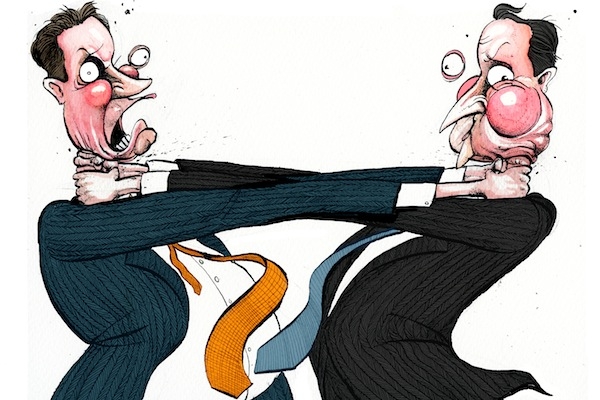You should take note when Benedict Brogan, an influential and widely sourced journalist who has been very close to the Cameron and Osborne operation over the years, writes of the fire-sale of Cameron shares. He says in today’s Telegraph that Cameron’s party view him as a ‘lame duck’ who makes ‘no difference’.
This is an extraordinary claim for disaffected Tories to make. True: the economy is mired and the government has tied itself to only one course of action. There have also been disasters at the department of health; and energy policy ought to be giving Number 10 an enormous headache.
But Cameron’s coalition is changing the landscape of education and welfare, both of which are enormous undertakings. There have been attempts to recast the immigration system; attempts which have had some success as net migration has fallen and, despite the economic malaise, more British citizens appear to be finding employment. There are rumours that further reform of the Border Agency is imminent, which would be most welcome. The police, the last great unreformed public service, are finally being put to task. There is determination, also, to put the European issue to bed, one way or another.
Backbench disenchantment with coalition, the numerous U-turns and David Cameron’s alleged timidity often fails to take note of the fact that this government has a story to tell. The problem lies in its near total inability to tell it.
From the point of view of communication, this is nothing short criminal as the reforms in education, welfare, policing and immigration have the rare distinction of being both pragmatic (ie, they broadly appeal to those who recognise that spending constraints necessitate change to a status quo that is less than stellar, and those who feel that systems which condemn the poorest to perpetual poverty are fundamentally immoral) and ideological (there are vested interests and ideologies to smash in education, the welfare state and the police force, while tough immigration policy is a well-aged piece of right-wing beef). It should be a sure sale, if handled with care and due attention to the public’s needs and desires. This task is not easy; but it is more than possible.
There is much progress still to make on the policy front, and one must question many of the reforms’ specifics and their application. This is not yet a ‘good government’, far from it; but to say that the Cameron ministry is making ‘no difference’ is nonsense. It is tempting to dismiss the doubting Tory tribe as being beyond convincing, and doubtless some of them are and always will be. But the government would assist its case enormously if it tried to sell that case to its own supporters. Politics is, at root, a matter of argument. The debate begins with one’s friends.






Comments